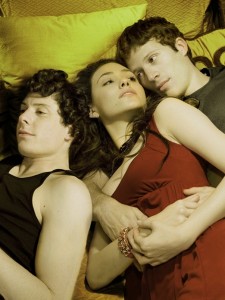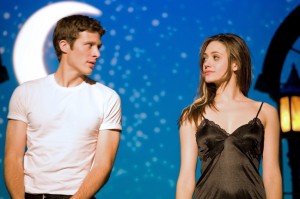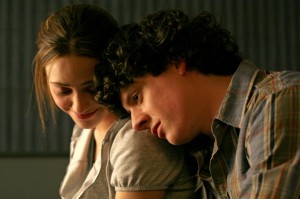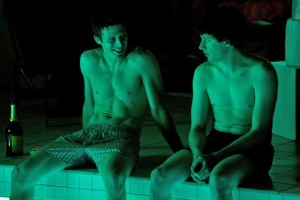Dare
 A filmmaker given money to expand his own short film into a feature has quite a conundrum. Should he try to work with the same materials and simply stretch the concept thin? Should he add distracting subplots in order to pad the running time and simply leave the short as it is, footage intact, such as with 2006’s Cashback? Or should he try to keep the same tone, but try to be ambitious and not just through casting? (Shorts tend to have amateur actors who took the job just to get the exposure.) Should he try for name actors? Should he be ambitious in the breadth of the story and the size of the production?
A filmmaker given money to expand his own short film into a feature has quite a conundrum. Should he try to work with the same materials and simply stretch the concept thin? Should he add distracting subplots in order to pad the running time and simply leave the short as it is, footage intact, such as with 2006’s Cashback? Or should he try to keep the same tone, but try to be ambitious and not just through casting? (Shorts tend to have amateur actors who took the job just to get the exposure.) Should he try for name actors? Should he be ambitious in the breadth of the story and the size of the production?
Adam Salky’s Dare, based on his 2005 short film, takes pieces from every one of those options above. The short was a fairly basic high-school gay fantasy; the lighting guy for the school’s stage production of A Streetcar Named Desire has a crush on the lead actor. The lead actor, Johnny, has trouble learning his lines, and the lighting guy, Ben (given the nickname “Light Boy”), offers to give Johnny a ride and help out with his lines. They drive to the Johnny’s house, he’s rich and has a glamorous indoor swimming pool, and Light Boy, though believably professing his sexual inexperience, goads Johnny into making out with him, and eventually seduces him. It’s rough around the edges. But kind of sweet*, though not all that memorable**.The feature film version is broken up into three parts, from three different perspectives, with the pool seduction as the centerpiece. Each main character, Johnny (Zach Gilford), Ben (Ashley Springer), and a character who has only a smidge of screen time in the short as Ben’s sole friend, Alexa (as played by Emmy Rossum), gets their own 30 minute section.
 Salky falters right away with Alexa’s piece, which is slow, shapeless, and has the look of a cheap TV drama. The one saving grace is a cameo by Alan Cumming, playing a successful actor coming back to visit the school at the behest of his former drama teacher, and who challenges Alexa about whether she has the life experience to be an actress. His scene is curt, direct, and cynical in all the right ways, and he makes you forget Rossum’s generally listless and uncomfortable performance. He also sets up the story well, as Alexa is shaken by his words and chooses to seduce Johnny at a party at his house. Rossum is supposed to be a driven, unpopular nerd who has her coming out party by dressing in skimpy clothing at Johnny’s house, causing all the other teens who used to make fun of her to gawk instead. But Rossum, dressed down and made to look tired, is simply too naturally attractive to pull most of her scenes off. Her transformation from self-conscious mouse to shallow, sexually voracious siren is already not particularly believable.
Salky falters right away with Alexa’s piece, which is slow, shapeless, and has the look of a cheap TV drama. The one saving grace is a cameo by Alan Cumming, playing a successful actor coming back to visit the school at the behest of his former drama teacher, and who challenges Alexa about whether she has the life experience to be an actress. His scene is curt, direct, and cynical in all the right ways, and he makes you forget Rossum’s generally listless and uncomfortable performance. He also sets up the story well, as Alexa is shaken by his words and chooses to seduce Johnny at a party at his house. Rossum is supposed to be a driven, unpopular nerd who has her coming out party by dressing in skimpy clothing at Johnny’s house, causing all the other teens who used to make fun of her to gawk instead. But Rossum, dressed down and made to look tired, is simply too naturally attractive to pull most of her scenes off. Her transformation from self-conscious mouse to shallow, sexually voracious siren is already not particularly believable.
 Dare gets its footing in the second Act, told from Ben’s perspective. In the short film, he was a shy, fairly well-built teen. In the feature, he’s full-on awkward nerd, even sporting a curly fro. The change works in some ways. It’s a shock to Alexa when Ben tells her he had sex with Johnny, whom she thought there was the possibility of a burgeoning relationship with. But because Johnny has gone from a muscle-bound jock to a wistful pretty boy (and a 30 year old teenager at that) who is defiantly, constantly proclaiming his heterosexuality during the pool scene, Ben has to be very aggressive; which, even though he’s inebriated, is quite out of character from what we’ve seen. As Ben loosens up and begins to discover himself (culminating in a potential orgy scene where’s he dressed like Al Pacino in Cruising), he also attains a heavy dose of lispy femininity, which may make sense given the uptight, rich private school he attends, at least as a way to overdo coming out in such a close-mouthed community. Ben’s section does get to the heart of some obviously confounding issues; namely how do out teens find dates, let alone companions, in a conservative area where the closet is the only available option?
Dare gets its footing in the second Act, told from Ben’s perspective. In the short film, he was a shy, fairly well-built teen. In the feature, he’s full-on awkward nerd, even sporting a curly fro. The change works in some ways. It’s a shock to Alexa when Ben tells her he had sex with Johnny, whom she thought there was the possibility of a burgeoning relationship with. But because Johnny has gone from a muscle-bound jock to a wistful pretty boy (and a 30 year old teenager at that) who is defiantly, constantly proclaiming his heterosexuality during the pool scene, Ben has to be very aggressive; which, even though he’s inebriated, is quite out of character from what we’ve seen. As Ben loosens up and begins to discover himself (culminating in a potential orgy scene where’s he dressed like Al Pacino in Cruising), he also attains a heavy dose of lispy femininity, which may make sense given the uptight, rich private school he attends, at least as a way to overdo coming out in such a close-mouthed community. Ben’s section does get to the heart of some obviously confounding issues; namely how do out teens find dates, let alone companions, in a conservative area where the closet is the only available option?
By the third act, that idea has gone out the window in favor of more simplistic psychological material, as Johnny tries to figure out “who he is.”*** That he finds the intimacy with not just Ben and Alexa, but with Ben’s touchy-feely parents (“you should try the popcorn, it’s organic!”), is a nice touch, especially as it goes with his lost puppy dog look.
 Dare is not a great film. Salky struggles especially with the first act, and he’s simplified the characters enough that they come together more as puzzle pieces than as lovers. But his ending is deliberately inconclusive and challenging. And it gives dramatic weight to earlier sequences. He also nails down the notion that when your fantasies come true, sometimes they are awkward and unsatisfying. There’s a reason they didn’t seem realistic.
Dare is not a great film. Salky struggles especially with the first act, and he’s simplified the characters enough that they come together more as puzzle pieces than as lovers. But his ending is deliberately inconclusive and challenging. And it gives dramatic weight to earlier sequences. He also nails down the notion that when your fantasies come true, sometimes they are awkward and unsatisfying. There’s a reason they didn’t seem realistic.
* You can find it on Youtube.
** Except for the knowing flirting and teasing that Johnny does which makes him more complicit in the sex.
*** Since his parents don’t seem to have any relationship with him, and his friends at school are intellectually limited.
P.S. Dare played in the 18 1/2 Philadelphia Film Festival. It opens in the US on November 13th.




holyfool says:
November 1st, 2009
12:56 am
To: Adam Lippe,
Greta! greta! review about the movie DARE, the full length version.
Just the cast itself was a joke, late 20’s and 30 years old people playing high schoolers?, for Hell sake that is so back in 90’s with 90210.
Your comments are so accurate and insightful for a movie that has no sense to exist.
The original short film from Salky was just perfect. With a precise tonality and balance of the characters, the director and his festive writer/producer David Brind did a great job for DARE as short coming of age film.
Why DARE as full length version?. Not a clue whatsoever. They should have saved that money and produced and directed something different.
Salky and Brind are brillant film makers, – please guys give us something fresh and new!.
Lets just hope for the best to come from these two.
holyfool